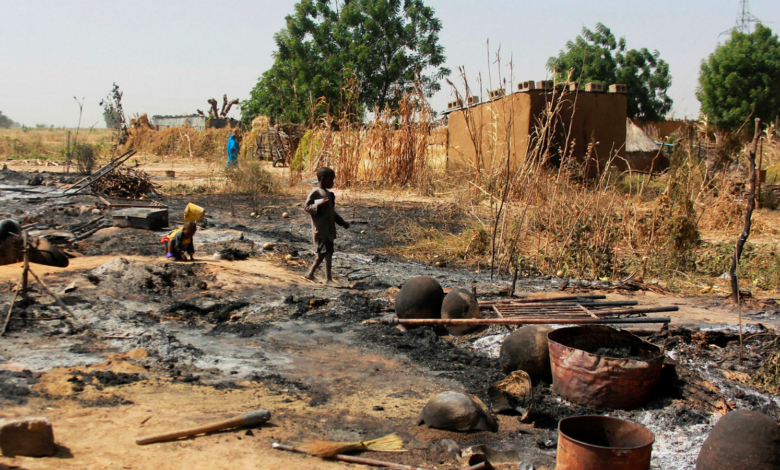Deliberate Damage To Farmlands Could Worsen Farmer-Herder Conflict In Nigeria’s Adamawa State — Report
In Adamawa state, Northeast Nigeria, violent farmer-herder conflict has been present since the early 2000s. According to an analysis of press reports, at least 305 people were killed across the state between 2016 and 2021 in herder-related clashes.

Damage to surrounding fields by pastoralists could be the leading cause of agro-pastoral conflict in communities of Adamawa State, Northeast Nigeria, with local farmers and breeders being the main actors involved in the incident, a new report has revealed.
In the report published by the Transhumance Tracking Tool (TTT) Early Warning which monitors transhumance movements, 285 alerts from April to May 2022 were captured.
The recent event alerts were triggered by the rise in incidents of burning of farmlands after harvest to create a scarcity of pasture for grazing, as well as to discourage herders grazing on farmland, which led to conflict in the LGAs such as Demsa.
The event alerts spread across 73 per cent of the wards in five LGAs. It is also reported that nine per cent of these incidents resulted in casualties or injuries, while less than one per cent of incidents led to displacements of populations.
The highest number of casualties or injuries were reported from Girei followed by Demsa and Lamurde LGAs.
The farmer-pastoralist conflict is one of Nigeria’s gravest security challenges. In recent years, competing claims to natural resources have grown with reports of violent clashes between farmers and herders’ communities in Adamawa.
An analysis of press reports documented by the Council on Foreign Relation’s Nigeria Security Tracker shows that at least 305 people were killed across the state between 2016 and 2021 in herder-related clashes.
Impacts of open agricultural burning
Open agricultural burning is usually done to clear stubbles, weeds and waste before sowing a new crop. However, it is highly unsustainable to the environment, as it produces large amounts of black carbon, and reduces the fertility of soil.
According to the Climate and Clean Air Coalition, open burning is the single largest source of black carbon, a short-lived climate pollutant that contributes to air pollution and climate change. The organisation also posits that the practice has, over time, destroyed the organic matter that makes soil fertile, causing crop yields to decrease, and increasing the need for costly fertilisers.
This trend could pose a severe impact on Nigeria’s farming output as it further reduces arable land. According to estimations from 2018, 37 per cent of agricultural land is arable.
HumAngle has also reported how food insecurity and malnutrition in West and Central Africa regions are expected to multiply in four folds by June 2022 which is said to be as a result of limited food production amongst others.
Other causes of agro-pastoral conflicts in the state, according to the Early Warning’s findings are non-use of official transhumance corridors, early or late passage of pastoral groups, and competition around animal resources.
LGAs such as Demsa, Fufore, Jada, Ganye, Hong, Mayo-Belwa, Numan, Toungo, and Yola South are also the potential risk areas in relation to late and massive movements, the report showed.
Support Our Journalism
There are millions of ordinary people affected by conflict in Africa whose stories are missing in the mainstream media. HumAngle is determined to tell those challenging and under-reported stories, hoping that the people impacted by these conflicts will find the safety and security they deserve.
To ensure that we continue to provide public service coverage, we have a small favour to ask you. We want you to be part of our journalistic endeavour by contributing a token to us.
Your donation will further promote a robust, free, and independent media.
Donate HereStay Closer To The Stories That Matter




